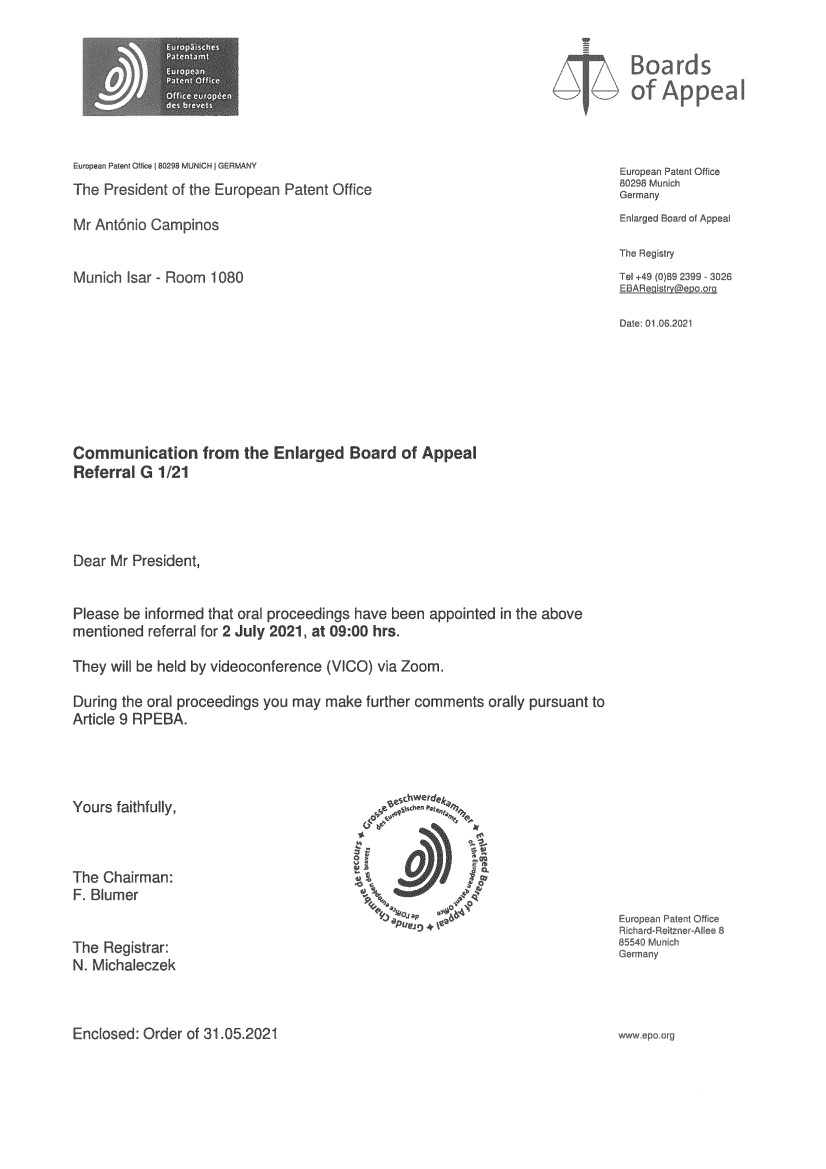

The main concern of António's Oompa Loompas in Haar seems to be churning out high quality legal fudge in a "timely" manner.
AS we have seen, the referral procedure G 1/21 got off to an inauspicious start when the President of the Boards of Appeal, Carl Josefsson, decided to disregard a fundamental principle of judicial conduct by insisting that he chair the panel entrusted with adjudicating the case.
"It remains to be seen whether the Enlarged Board will continue in rubber-stamping mode or whether it has learned any lessons from the events of 28 May and its previous misguided prioritisation of "speed" over "diligence"."However, despite his obvious conflict of interest in the matter, for some inexplicable reason Josefsson acted as if this was nobody's business but his own.
Following a wave of critical and outraged public reaction to such a clear-cut case of judicial misconduct, Josefsson's peers responded by removing him from the procedure on 17 May in a secretive session from which the parties were excluded.
But although Josefsson was removed from the adjudicating panel, the Enlarged Board failed to distance itself from his previous actions and to take appropriate measures to restore public confidence in the integrity of the procedure.
On the contrary, despite sidelining Josefsson, the Enlarged Board stuck to the "roadmap" which the former Chairman had imposed upon it and acted in a manner which strongly suggested that it had no qualms about sacrificing "diligence" for the sake of "speed" - or "timeliness" as the EPO's management likes to call it.
There is an old adage according to which "Justice delayed is justice denied".
However, as case no. G 1/21 shows, "justice" rendered in an overly precipitous manner can be just as problematic.
But although the Enlarged Board refused to contemplate a postponement of the hearing scheduled by Josefsson, the plan to rubber-stamp mandatory ViCo hearings before the Boards of Appeal did not turn out to be quite the "slam dunk" that the overlord of Haar and his "handlers" on Team Campinos had hoped for.
On the contrary, during the ViCo hearing held on 28 May, the appellant won a small but significant intermediate legal victory when it successfully demonstrated that the Enlarged Board had failed to respect its own procedural rules.
"Right now it's far too early to make any reliable predictions as to what the outcome of the hearing on 2 July is likely to be."This resulted in an adjournment of the case to allow the appellant more time to formulate its response to the comments from the President of the Office.
The proceedings are now scheduled to resume on 2 July. [PDF]

It remains to be seen whether the Enlarged Board will continue in rubber-stamping mode or whether it has learned any lessons from the events of 28 May and its previous misguided prioritisation of "speed" over "diligence".
Right now it's far too early to make any reliable predictions as to what the outcome of the hearing on 2 July is likely to be.
In his commentary on the hearing of 28 May, a former EPO Director Daniel Thomas speculated that "[h]aving shown that he masters the procedure before the EBA better than the EBA itself as well as the President’s representative [Mihály Ficsor], the representative of the opponent [appellant] might well surprise us once again".
On the other hand, as things stand, it also remains a distinct possibility that the procedure could still end up as just another pro forma rubber-stamping exercise.
"On the other hand, as things stand, it also remains a distinct possibility that the procedure could still end up as just another pro forma rubber stamping exercise."It would be nice to think that the events of 28 May have given the Enlarged Board pause for thought.
However - looking at their track record to date - there is no tangible indication that António's Oompa Loompas in Haar are concerned about anything other than churning out high quality legal fudge in a "timely" manner.

The dogs are barking and the caravan moves on... but where exactly is it heading?